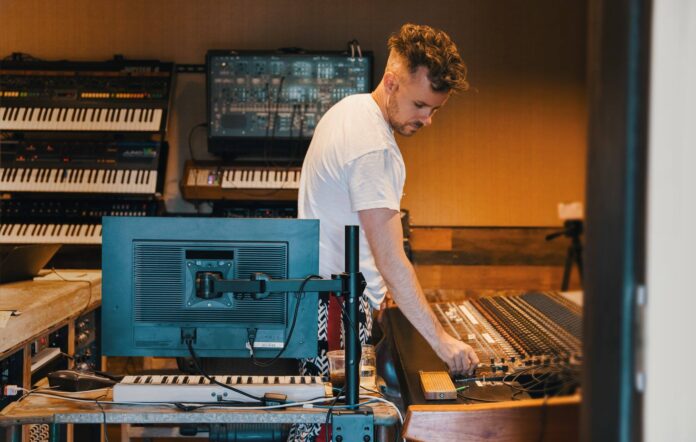When Ricky Reed wants to make a hit, he just reads the room.
“You have to create a space where everybody feels relaxed,” says the Oakland-bred, LA-based pop producer, who’s helmed hits like Lizzo’s “Truth Hurts” and Jason Derulo’s “Talk Dirty.” “But I won’t say it feels good or feels happy, because the point is that if an artist is having a tough day, you want to create a space where they can express that freely.”
Since the beginning of the COVID-19 pandemic, Reed’s been forced to create a different kind of space for himself and his collaborators. His Nice Live livestream series, named for his Nice Life label, find Reed bouncing musical ideas around with a cast of friends and making songs in real time.
“I was using the writing and production of songs for the livestream as a way to keep in touch with my friends,” says Reed, a self-described extrovert who was emotionally hard-hit during the pandemic. “And then as I got a little ways into it, I realized, shit, I’m making an album.”
The Room, which came out on Nice Life on August 28, is his debut under his own name—though longtime Bay Area locals may remember his early-2010s project Wallpaper., which epitomized and subverted the era’s escapist electro-sleaze. But despite being the first album credited solely to Ricky Reed, he’s hardly the loudest voice on it.
“I don’t sing on it,” he confirms. “It wasn’t too conscious of a decision. It just never felt urgent to me because of the way all these other voices and songs were clicking with me.”
Though big names like Alessia Cara and Leon Bridges occasionally show up, most of the voices belong to up-and-comers and Nice Life signees. Reed co-wrote some of the lyrics with the singers but mostly kept a hands-off, behind-the-boards approach.
“The only thing I would tell the artists as far as directions was just ‘be current and be honest about whatever you’re dealing with,’” says Reed.
Humility and honesty are values Reed keeps close to his heart—though, as he puts it, “I don’t think clarity arises naturally with success.” “Truth Hurts” became Reed’s first chart-topper in September of 2019 and was nominated for three Grammys, winning Best Pop Solo Performance, after its appearance in the Netflix rom-com Someone Great.
He could’ve made a decadent super-producer showcase, but he consciously resisted falling back on his newfound clout. “There are a lot of pop stars that I’ve worked with who would have probably been happy to get involved in a project like this,” he says. “But I just let it be who I thought would be good for the song or acts that I’ve just been a fan of for a really long time.”
The sound of The Room likewise shies away from the brash, bold, bass-heavy production style that’s put Reed in such high demand. The Room is nocturnal, smoky, slightly jazzy, heavily based on digital presets, and not as far removed from the Harold Budd ambient album of the same name than you might expect.
“Working on this project has allowed me not only to process 2020 but to make something for the sake of making it as opposed to making an album because I have more of a platform,” he says.
It’d be a stretch to call The Room anti-commercial given the sugary melodies and vocal curlicues on display throughout, but it’s a heavy album. The Alessia Cara collab, “Fav Boy,” opens with a disarmingly personal verse about a relative’s funeral. Another song’s chorus is “I’m scared of the future/I’m afraid of failure.” There are a lot of lyrics about falling into water, and a lot about crying. It ends with “some kind of rebirth,” perhaps the making of the album itself.
While listening to singer St. Panther’s “Real Magic” vocal take on his livestream, Reed suddenly found himself tearing up. He blames it on a rough day, but he also acknowledges that amid the ups and downs of his life—getting married and having kids, winning a Grammy, and suddenly finding his world shrinking during the pandemic—he’s found himself more emotionally responsive to music.
“I find happiness in trying to get closer to the root of a feeling, how I feel, how my kids feel, my loved ones around me,” says Reed. “And I think the point is that you never arrive there. You’re never finished. You just continue trying to get closer to it your whole life. And there’s a lot of joy in the process.”







